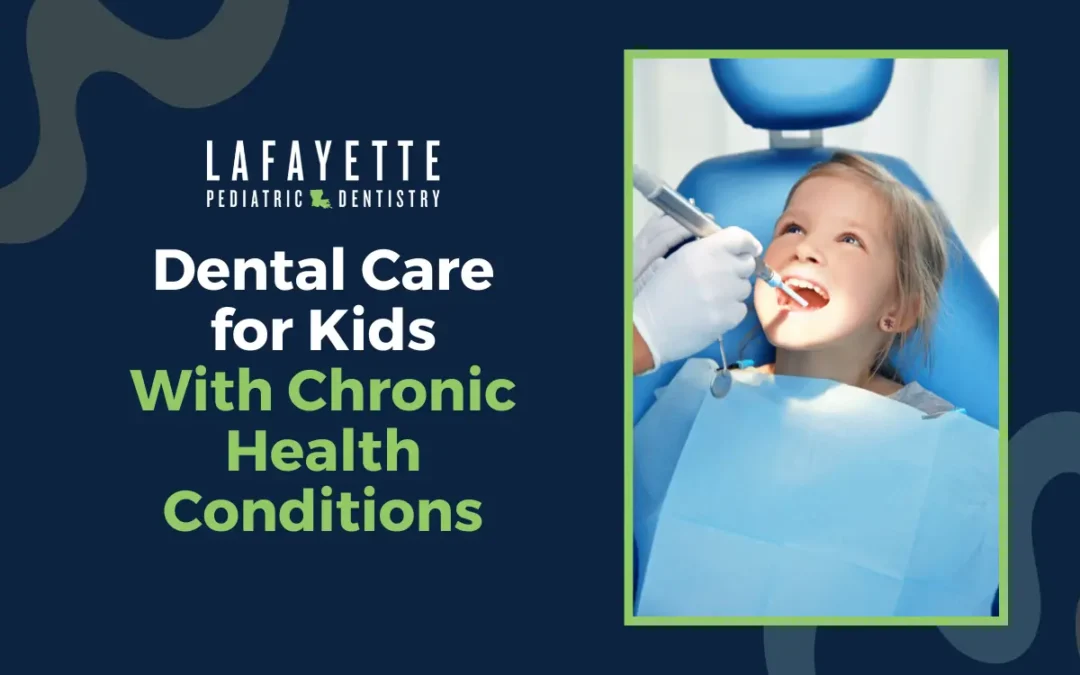When your child has a chronic medical condition, it’s natural to want to be extra vigilant about their health. Regular check-ups get scheduled, symptoms get monitored, and medications are taken on time. But many families don’t realize that our health is interconnected, and this is no different with oral health.
In our years practicing pediatric dentistry here in Lafayette, we’ve seen firsthand how medical conditions can significantly impact a child’s oral health. When your child has a chronic condition, there’s often a ripple effect that extends to their teeth and gums.
It’s not something most families think about initially, but it’s something we encounter quite regularly in our practice.
The connection isn’t always obvious at first. A family might bring their child in for a routine cleaning, and we discover more cavities than expected or notice signs of gum irritation that seem unusual for their age. When we ask about medical history and medications, the puzzle pieces often fall into place.
Here, we want to walk you through some of the most common chronic conditions we see and how they can affect your child’s oral health. Understanding these connections can help you be more proactive in protecting your child’s dental health.
Oral Health in Children with Asthma
Asthma is probably one of the chronic conditions we see most often in our pediatric office. It affects so many kids in our community, and unfortunately, it can create some real challenges for their oral health.
Children with asthma face a significantly higher risk of developing cavities and gum disease. The main culprit is usually their medications. Many asthma medications, especially inhalers, can cause dry mouth as a side effect.
When your child’s mouth doesn’t produce enough saliva, this creates the perfect environment for bacteria to thrive. Saliva is nature’s way of washing away food particles and neutralizing acids that attack tooth enamel. Without enough saliva flow, bacteria and tartar build up much more quickly.
But that’s not all. Some asthma medications can thin tooth enamel over time, which increases the risk of cavities forming.
There’s another issue we see with asthma patients: oral thrush. Kids who take oral steroids for their asthma have an increased risk of developing this fungal infection in their mouth. It shows up as white patches on the tongue, inner cheeks, or roof of the mouth, and it can be quite uncomfortable.
Here’s a practical tip to help prevent oral thrush: have your child gargle and rinse their mouth with water after using their inhaler to wash away medication residue and reduce the risk of fungal infections.
Read more: The 5 Most Common Causes of Cavities in Children
Oral Health in Children with Diabetes
Diabetes is another condition that we see regularly in our office, and it brings its own set of oral health challenges. The relationship between diabetes and oral health is concerning because it works both ways: diabetes can worsen oral health problems, and poor oral health can make diabetes harder to control.
Children with diabetes are at a much higher risk of developing gingivitis, which is the early stage of gum disease, and periodontitis, the more advanced form.
What’s particularly troubling is that gum disease in children with diabetes tends to develop earlier than in other kids, progress much faster, and take significantly longer to heal. It’s like their bodies are fighting an uphill battle. Meticulous oral hygiene is even more important to prevent this condition from worsening.
Just like with asthma, many diabetes medications can cause dry mouth, which again creates the perfect environment for cavity-causing bacteria to multiply. The lack of saliva means less natural cleaning and protection for the teeth.
There’s also a condition called burning mouth syndrome that some children with diabetes experience. This causes a persistent burning sensation inside the mouth and is often linked to uncontrolled blood glucose levels.
It can make eating, drinking, and brushing uncomfortable, sometimes leading to poor oral health or avoidance of certain foods, which could lead to poor nutrition.
Prevention is Your Best Defense
Prevention becomes even more critical for children with medical conditions. We can’t stress this enough to families in our practice. Regular brushing and flossing are absolutely non-negotiable for kids with chronic conditions.
The same goes for routine dental visits. These appointments aren’t just about cleaning teeth anymore, but also about monitoring your child’s oral health and catching problems before they get serious. For kids with chronic conditions, we might recommend more frequent visits so we can stay ahead of any issues.
Diet plays a huge role too. Watching their intake of sugary drinks and foods can help prevent cavities and other problems.
Read more: Surprising Habits That Can Affect Your Child’s Dental Health
One of the most important things you can do is keep your pediatric dentist in the loop. Always let us know about any medications your child is taking, and definitely mention if anything has changed since their last visit. Sometimes, a new medication or a change in dosage can affect oral health in ways you wouldn’t expect.
With the right care, attention, and professional support, they can maintain healthy teeth and gums alongside managing their medical condition.
At our Lafayette pediatric dental practice, we understand the unique challenges that come with caring for children with chronic conditions. We offer a comprehensive range of dental services, including specialized care tailored to your child’s specific needs.
If you have any questions about how your child’s medical condition might be affecting their oral health, don’t hesitate to give us a call. We’re here to help your child maintain a healthy, happy smile for life.
